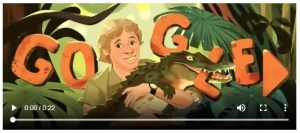Newspaper (Opinion Editorial)
Newspaper Opinion (OpEd) Conventions: Newspapers often include an Opinions/Opinion Editorial (Op Ed) pieces. These short pieces of writing are typically based upon a current, relevant, and accessible topic on which the writer (sometimes called a columnist) feels strongly. These pieces are often informal in tone and don’t tend to include a lot of formal research. Because the article is based upon someone’s personal opinion and experience, these pieces are often written with the purpose of sparking debate and conversation with readers, and sometimes these readers will write into the newspaper with a response. Usually, the writer aims to inform, persuade, and even inspire change when writing an Op Ed.
Logan, T. (2019, March 4). Opinion: Steve Irwin inspired generations of environmentalists. Sheridan Sun. Retrieved from http://sheridansun.sheridanc.on.ca/2019/03/04/opinion-steve-irwin-inspired-generations-of-environmentalists/
OPINION: Steve Irwin inspired generations of environmentalists
By Taylor Logan

I remember being a kid, waking up early and buzzing in my pyjamas. I would run down to the family room, before anyone else was awake, and turn on the TV. This was a time before guides, and a time before I understood scheduled TV. I could only hope and pray once that light came on, Steve Irwin would be on the screen.
Steve Irwin, also known as the Crocodile Hunter, was an Australian zookeeper, conservationist, award winner, television personality and inspiration to my inner tomboy and wildlife activist side. And when he died on Sept. 4, 2006, I cried for days over the loss of the man who inspired me and my love for the environment.
So, imagine my surprise when, last week, on the Crocodile Hunter’s birthday, PETA accused Steve Irwin’s conservation mission, of bringing the excitement of education to children around the world, as nothing more than a “dangerous, fawning message.”
#SteveIrwin was killed while harassing a ray; he dangled his baby while feeding a crocodile & wrestled wild animals who were minding their own business. Today’s #GoogleDoodle sends a dangerous, fawning message. Wild animals are entitled to be left alone in their natural habitats. https://t.co/9JfJiBhGLw
— PETA (@peta) 22 February 2019
Steve Irwin’s actions were not on target with his supposed message of protecting wildlife. A real wildlife expert & someone who respects animals for the individuals they are leaves them to their own business in their natural homes.
— PETA (@peta) 23 February 2019
It is harassment to drag exotic animals, including babies taken from their mothers, around from TV talk shows to conferences & force them to perform as Steve Irwin did. Animals deserve to live as they want to, not as humans demand––the #GoogleDoodle should represent that.
— PETA (@peta) 23 February 2019
On Feb. 22, Google Doodles celebrated what would have been Steve Irwin’s 57thbirthday by Tweeting out illustrations honouring his achievements and passion for wildlife conservation, and soon after PETA responded, with not one, but three Tweets.

I was outraged, and I wasn’t the only one.
Soon twitter blew up, and so did the media.
It seemed shocking that PETA, known for its controversial history, could bash a dead man for doing nothing wrong.
Irwin was a man who had been wrangling crocodiles since the age of 9, who had sparked projects, partnerships and wildlife facility initiatives through his work. He was a man who showed kids that animals, even the dangerous ones, were nothing to be scared of, but something we need to save.
Steve Irwin was a man who inspired a generation. Literally.
According to a study done by Regent University in Virginia, people who were fans of Steve Irwin, his life, his show, his conservation efforts, now have a stronger interest in doing their part in saving the environment, and after his death, the interest grew even more. This created a generation of passionate, eco friendly twenty-somethings.
And the impact didn’t stop there.
Australia Zoo, started by Irwin’s parents and continued now by his wife and kids, continues to inspire the world through their efforts.
“Australia Zoo’s motto ‘Conservation Through Exciting Education’ is based on Steve’s beliefs” said Australian Zoo’s education team, “and everything we are involved in and accomplish are based on his goals and vision for the zoo. We are extremely focused on continuing his legacy through education and conservation. You can’t expect people to learn about wildlife and want to conserve it and the environment without being engaged. As such we must therefore be entertaining but also providing many different opportunities to engage our visitors in our education and conservation messages.”
Continuing on the legend of Steve Irwin is not an easy one, but Australia Zoo is following heavily in his footsteps. From projects, to partnerships, to properties, to still educating millions of children around the world, the Irwin family and their zoo has become a hub for saving animals that wouldn’t otherwise have a chance.
Steve Irwin still is greatly missed, and despite the PETA controversy, it is a thrill to know that there are people out there who watched his show, still in their pyjamas, just like me. Those who know the true Steve Irwin and the efforts he put forward to saving our world. I wonder now if what he would’ve accomplished if not for his tragic death.
As a kid who also grew up in nature, from wrangling frogs in the local creek, to picking up garbage in the forest behind my grandparents’ house, to always searching for the next adventure, I hope one day I can be as half as passionate about what I believe in as Steve Irwin was.

In one of his last interviews, Irwin said “If there’s one thing that I, Steve Irwin, would want to be remembered for, it’s be remembered for passion and enthusiasm. Conservation is my job, my life. My whole persona.”
I hope that wherever the Crocodile Hunter is now, he knows he is remembered for just that.
And I hope our world can continue on his legacy.
© 2019 Sheridan
